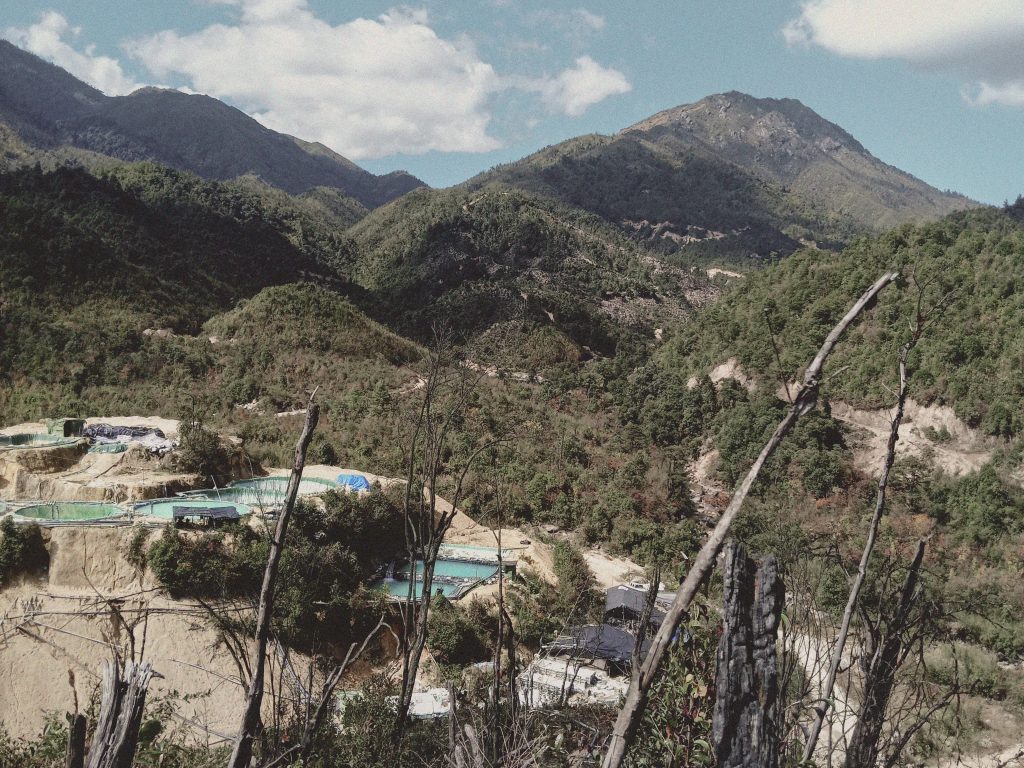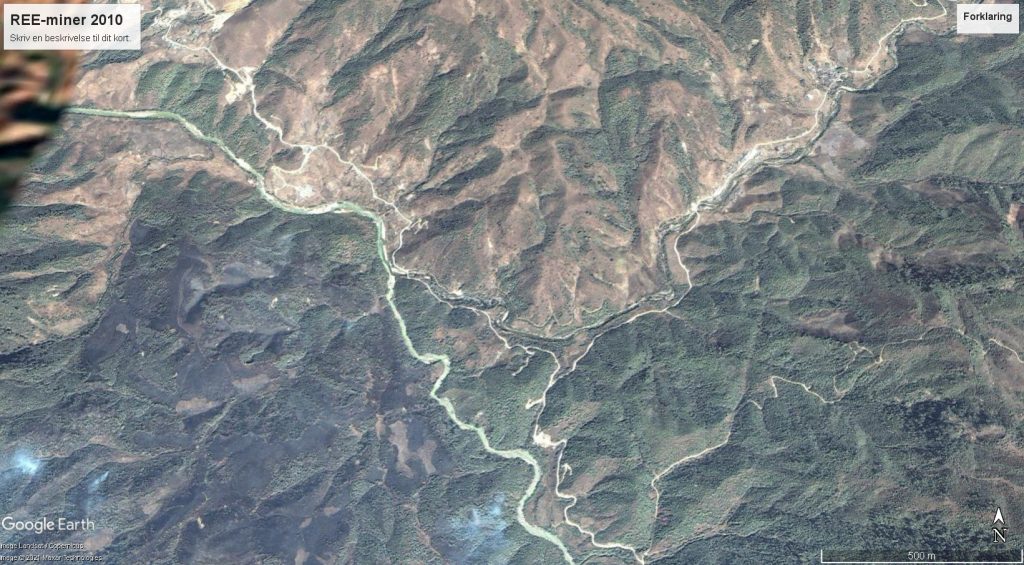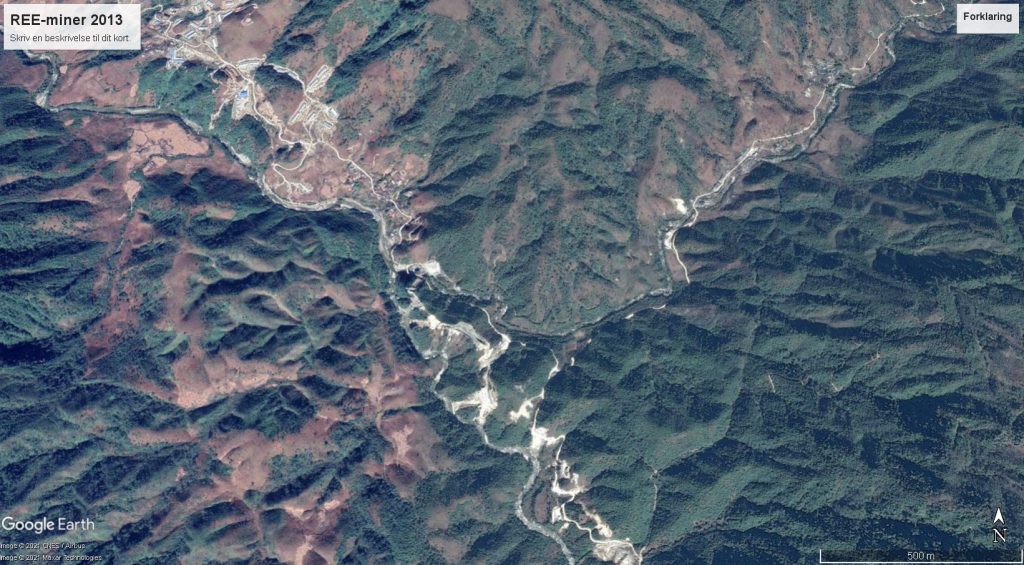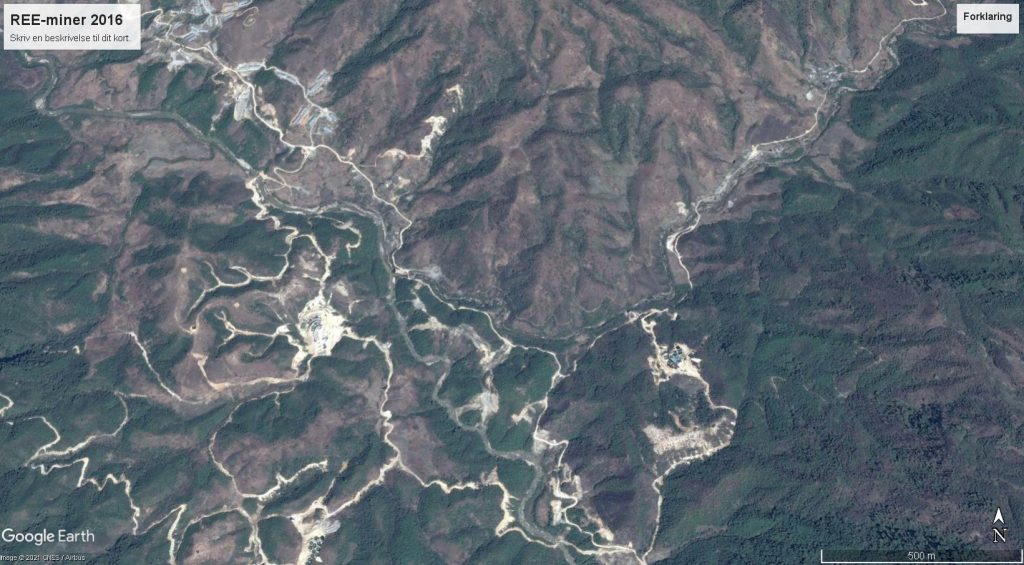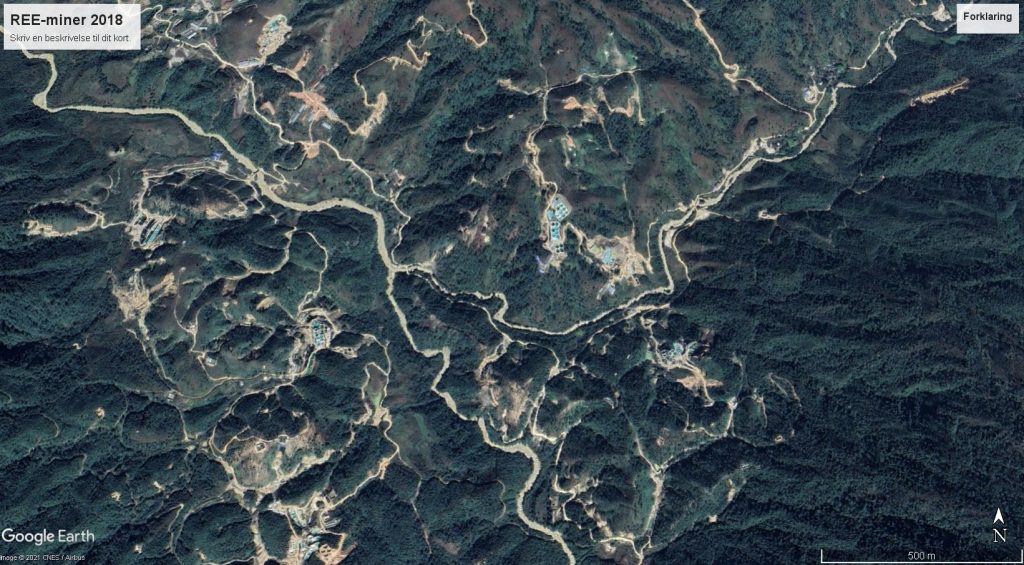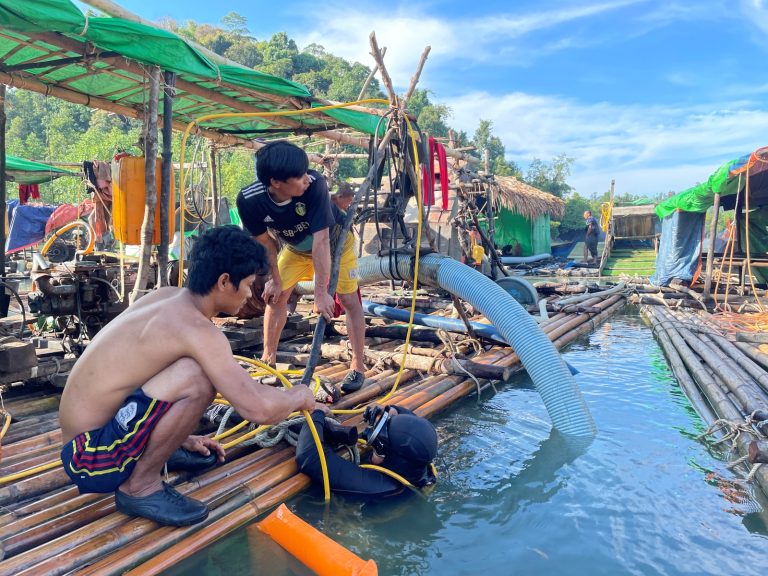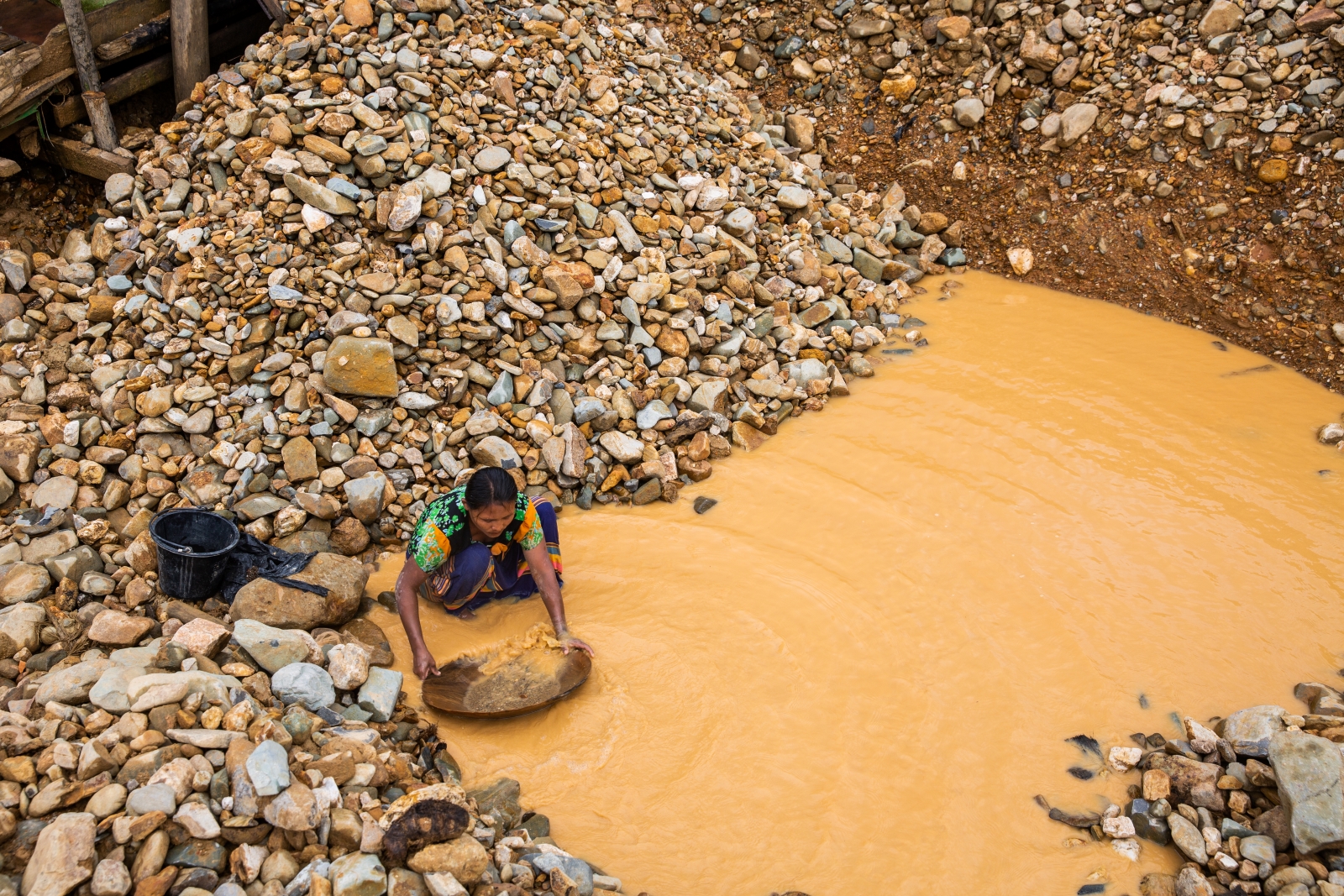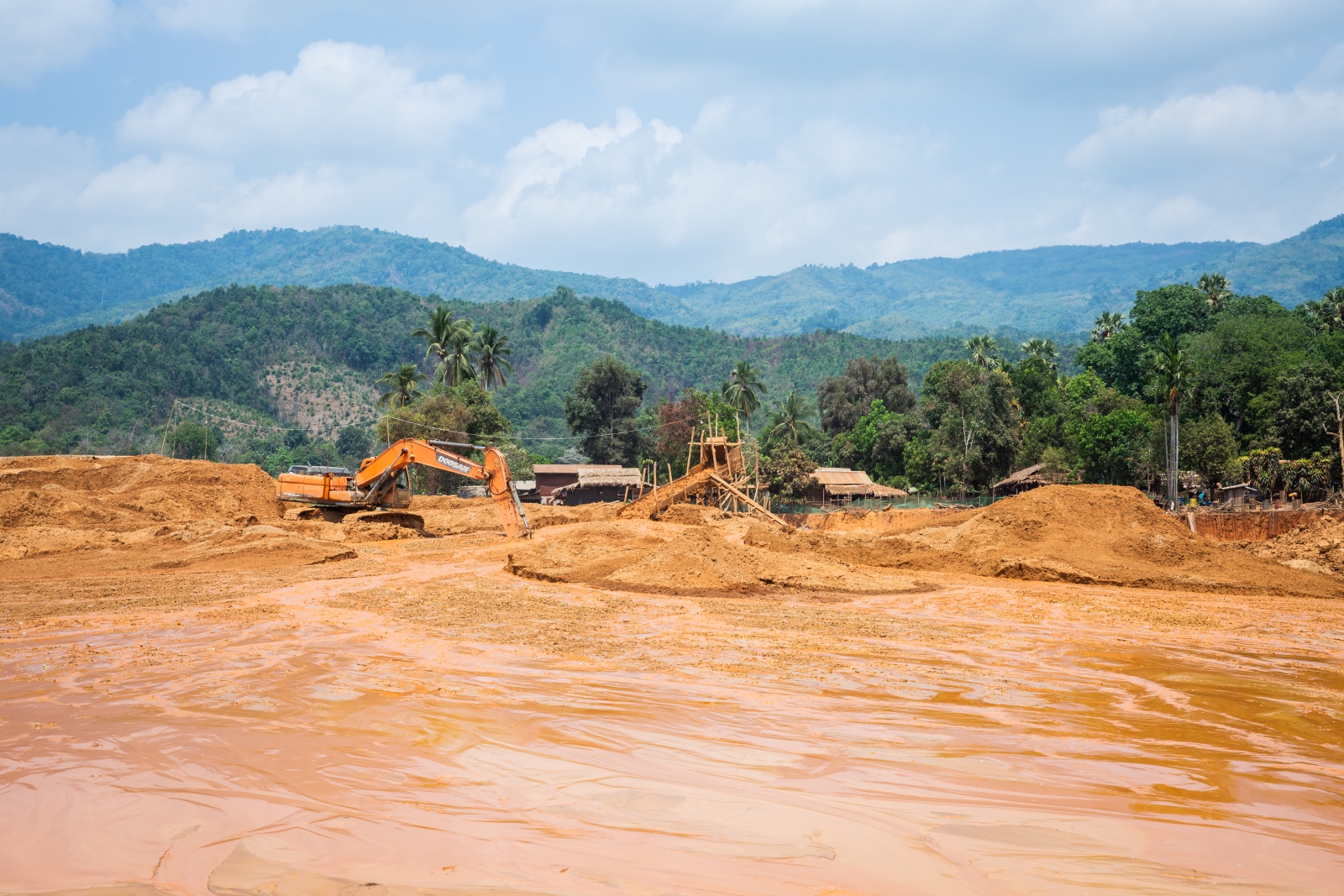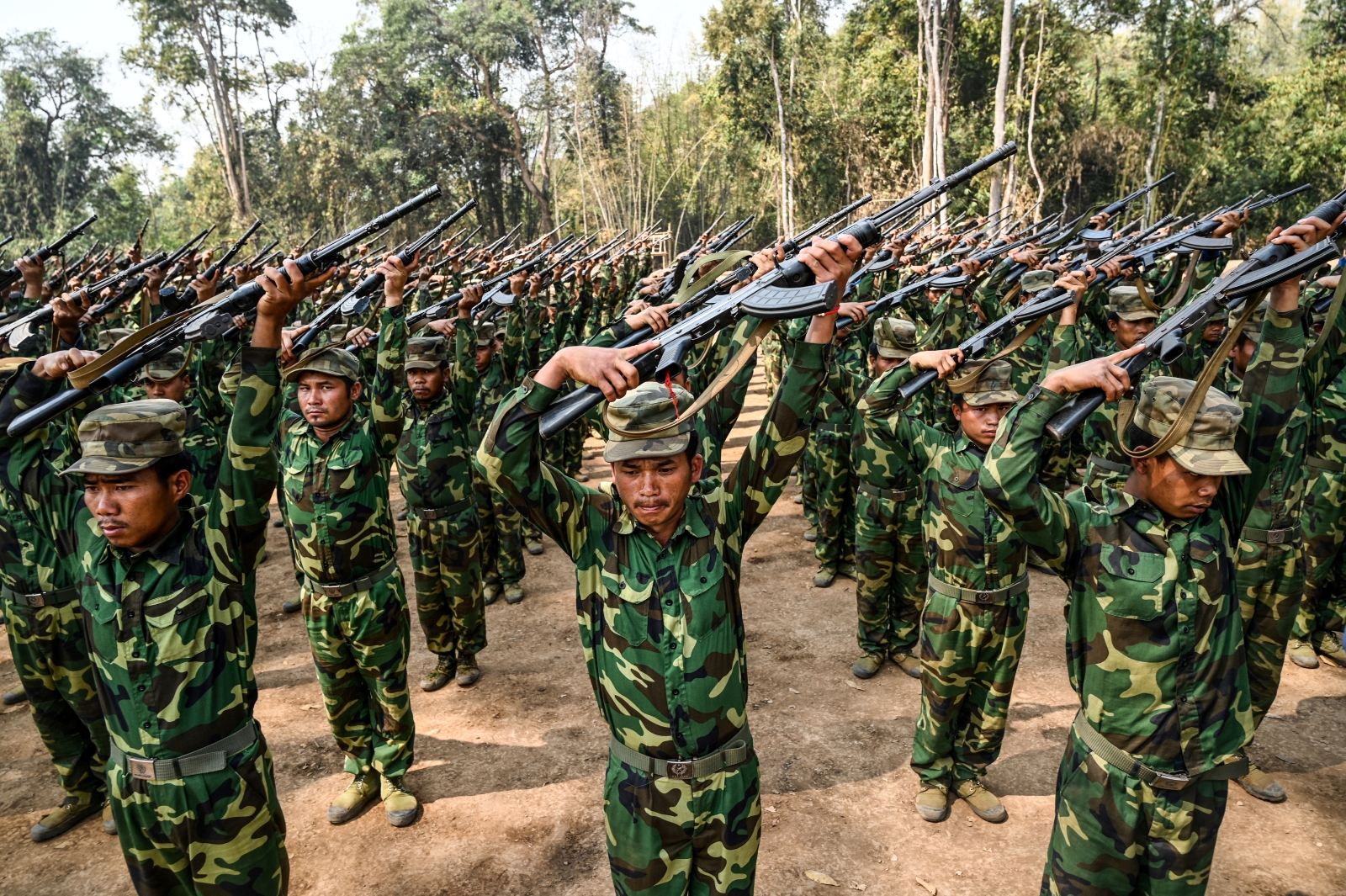The leader of a Tatmadaw-controlled Border Guard Force in a remote region of Kachin State has emerged as a key player in the global rare earth trade, and has turned the territory under his de facto control into a mining hub at a high environmental cost.
By JAUMAN NAW, EMILY FISHBEIN and RONJA PILGAARD
In mountainous areas of Kachin State bordering China’s Yunnan province, the land is rich in rare earth – elements that are used worldwide in everything from cellphones and laptops to precision-guided weapons.
Rare earth mining in Kachin has turned Myanmar into the world’s third-largest official exporter in just a few years.
Multiple sources told Frontier and Danwatch, a Danish investigative outlet that collaborated on this investigation, that the rare earth mined in Kachin is extracted illegally by Chinese or Chinese-backed companies in areas of Chipwi Township under the de facto control of an armed group and militia led by Kachin warlord Zahkung Ting Ying.
A former officer with the Kachin Independence Organization, Zahkung Ting Ying led a breakaway unit in 1968 that merged with the Communist Party of Burma. When the CPB dissolved in 1989, he established the New Democratic Army-Kachin, and in 2009 the NDA-K became the first ethnic armed group to transition into a Border Guard Force (BGF) under the Tatmadaw. Zahkung Ting Ying also heads a Tatmadaw-aligned militia in the same region, sources told Frontier.
“As a BGF, Zakhung Ting Ying and his former NDA-K are also part of the Tatmadaw chain of command, meaning it is technically a Tatmadaw unit engaged in this rampant illegal mining,” said Ms Clare Hammond, Myanmar researcher with London-based environmental watchdog Global Witness.
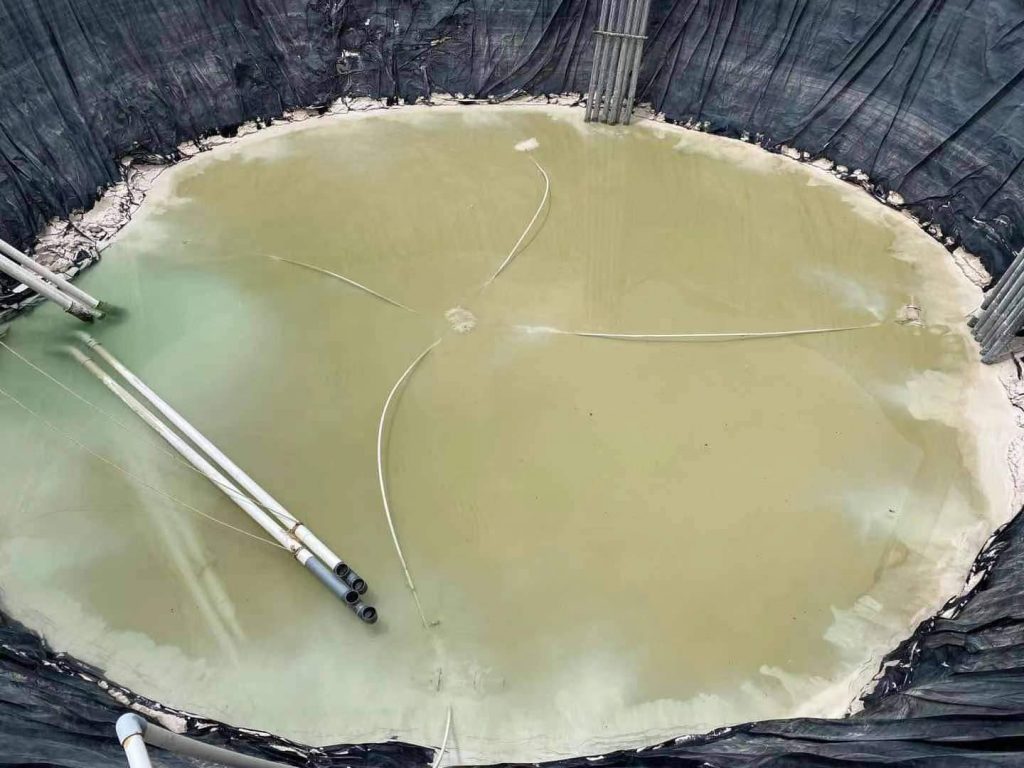
Outsourcing environmental costs
As early as 1987, the then leader of China, Mr Deng Xiaoping, predicted that rare earth elements would be crucial to the modern economy. “The Middle East has the oil, but China has the rare earths,” he said during a visit to a production site in Inner Mongolia, a Chinese province.
A group of 17 metals, rare earth elements are actually widely distributed over the earth’s surface but are often not concentrated enough to make extraction financially viable. Mining is also environmentally costly: wastewater and tailings ponds can leak acids, heavy metals and radioactive elements into soil and groundwater, while deforestation leads to erosion and destroys ecosystems.
China has long been the world’s dominant player in rare earth mining, accounting for 95 percent of all official extraction in 2010, according to the United States Geological Survey.
But rising demand for products containing rare earth elements – including in the permanent magnets used in wind turbine generators and electric car motors, as well as for use in the LED screens in our mobile phones and computers – has prompted efforts to diversify production. Rare earths’ utility in military technology, such as drones, has also boosted their global demand and strategic value, including for the US army.
At the same time, China has tightened export laws and introduced comprehensive environmental regulations that have curtailed its own official extraction, particularly since 2015.
Sources familiar with the industry told Frontier and Danwatch that China’s tightening regulations have pushed the extraction of rare earth elements – and particularly a subset known as heavy rare earths, which are in high demand for their use in high-tech weapons, among other products – across the border into Myanmar.
“China has either closed or suspended most of its extraction of heavy rare earths and replaced it with imports from Myanmar,” said David Merriman, a specialist in rare earth elements at the international consulting firm Roskill Information Services, which deals with supply chains of critical raw materials.
China’s official trade data shows that from 2014 to 2020 its imports of rare earth elements from Myanmar jumped from just 300 tonnes to 35,500, with the latter worth US$388 million. By 2019, Myanmar had surpassed Australia to become the world’s third-largest official producer of rare earth elements after China and the United States. Last year, 94 percent of rare earth elements officially imported by China came from Myanmar.
Hammond of Global Witness told Frontier that official trade data may only offer a glimpse into the scale of Kachin’s rare earth mining industry, given its “illegal nature” and because the Kachin State-China border is “highly porous”.
Zahkung Ting Ying appears to have seized the opportunity to make a profit from these trends, with sources telling Frontier that rare earth elements are extracted from territories under the control of his BGF and militia before being driven across the border for processing.
Due to the illegal nature of rare earth mining and its occurrence in territory controlled by Zahkung Ting Ying’s armed groups, it is difficult to track the companies or individuals which are actively engaged in the industry, but local activists and mine workers told Frontier that the bosses and senior workers on the sites are Chinese and that the companies are of Chinese origin. Similar patterns have emerged in other industries in Kachin State, including in the jade mines of Hpakant township and tissue-culture banana plantations across Waingmaw township, where Chinese-backed companies have partnered with Myanmar-registered companies or entered the state illegally in order to skirt regulations when conducting business.
Dr Hkalen Tu Hkawng, a Kachin activist and the minister for natural resources and environmental conservation in the parallel National Unity Government, said that local authorities under the Tatmadaw and armed actors like Zahkung Ting Ying’s BGF might also take taxes or bribes from Chinese businessmen in exchange for permission to mine rare earth – a practice that he said is also common among opium poppy farmers in areas of Waingmaw township under the control of Zahkung Ting Ying’s BGF. “The [former] NDA-K and Tatmadaw know what is happening where, and if they didn’t get anything from it, they wouldn’t stay quiet,” he said.
Cross-border collaboration
The history of rare earth mining in Kachin is murky. Several knowledgeable sources told Frontier that they believed some of the first rare earth mining in the state occurred in areas controlled by the Kachin Independence Organization in the years leading up to the collapse of a ceasefire with the Tatmadaw in 2011, but that mining has now mostly or entirely stopped in KIO-controlled areas.
KIO information department head Colonel Naw Bu told Frontier that the KIO is not officially engaged in rare earth mining, but has allowed exploration in an area of its eastern district known by the Kachin name of Mung Hkawng Pa, in the Mai Ja Yang region. Col Naw Bu said he was not authorised to answer further questions related to rare earth mining in KIO-controlled areas.
Google Earth satellite images show four clusters of pools in a mountainous area northwest of Mai Ja Yang town. The pools look identical to those in photographs given to Frontier by people who worked on rare earth mining sites in Chipwi Township, as well as photos and videos taken by several media who visited rare earth mining sites in Chipwi Township in 2019.
But the number of apparent rare earth mining sites in the Mai Ja Yang region pales in comparison to the mining in Zahkung Ting Ying’s BGF and militia-controlled territory.
Six knowledgeable people interviewed by Frontier said that nearly all rare earth mining in Kachin takes place in areas under control of Zahkung Ting Ying’s BGF and militia, particularly in the area around the border town of Pangwa, alternately spelled Pangwar or Panwar.
Several sources told Frontier that rare earth mining started picking up in this area around 2014 or 2015. Satellite images of the border area show around 100 sites in the region with the pools characteristic of rare earth mining.
The sources said that the mining was happening with impunity.
“Even though there are complaints from local people, rare earth mining is controlled by the BGF, which has weapons, power and money, so they don’t listen to local voices,” said an activist based in Myitkyina.
A representative from the Transparency and Accountability Network Kachin State (TANKS), a local civil society group, told Frontier that land seizures are among many problems which locals face as a result of rare earth mining.
“The [former] NDA-K and rare earth companies forcibly grab local people’s farmland and give compensation without any negotiation. If local people don’t accept, they won’t offer anymore; maybe they will offer less than before. Local villagers have no chance to complain,” said the source, who asked not to be named.
Impunity is nothing new in territory under control of Zahkung Ting Ying’s armed groups, local activists told Frontier. Although the NLD and civil society groups tried to monitor rare earth mining, enforcing the law was almost impossible, said the TANKS representative, whose organisation focuses on monitoring natural resource governance. Tatmadaw personnel would typically accompany assessment teams made up of NLD and civil society representatives on mining site visits, they said, and when the teams arrived, the mining would stop temporarily.
“When they went back to Myitkyina, [rare earth mining] resumed. The NLD government tried to regulate rare earth mining as much as they could … but the main implementers are armed groups, so it wasn’t possible … [The NLD] could only say, ‘stop illegal mining’, but it wasn’t really effective on the groups holding weapons.”
Frontier’s calls to Tatmadaw spokesperson Major-General Zaw Min Tun went unanswered.
Frontier was also unable to reach Zahkung Ting Ying for comment, and his son, politician and former NDA-K senior commander Zahkung Ying Sau, declined an interview request. An official from the New Democracy Party (Kachin), a political party led by Zahkung Ying Sau, who was elected to the state hluttaw in 2020, said the party was not involved in rare earth mining and refused to comment further.
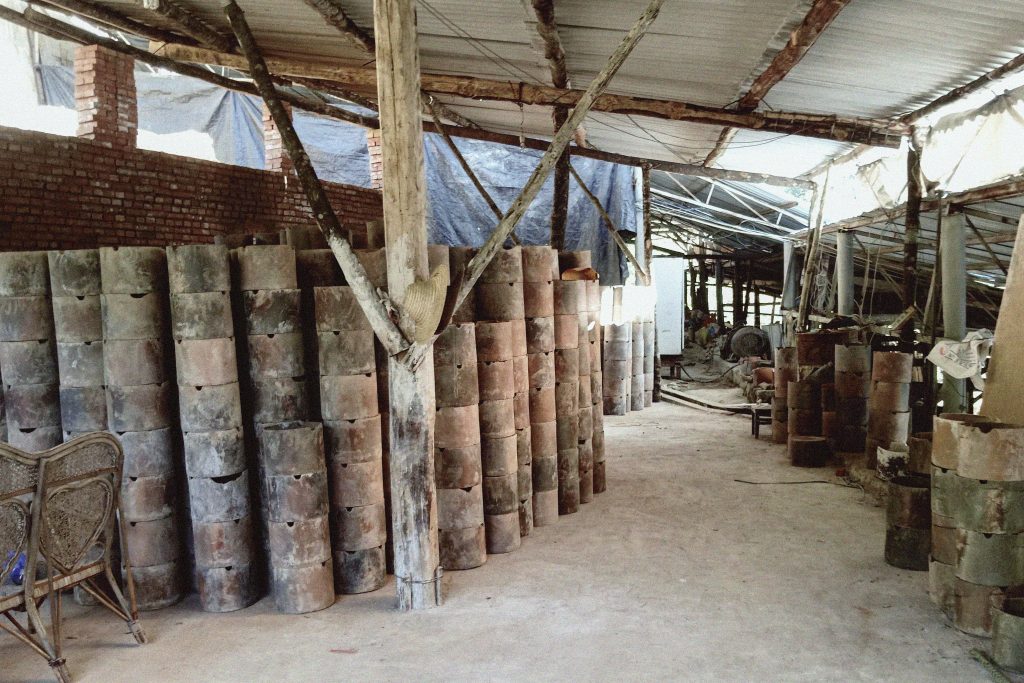
A web of permits
Myanmar mining permit records show that dozens of exploration permits have been issued to mining companies in the stretch of Kachin State’s border with China under control of Zahkung Ting Ying’s armed groups.
Since 2014-15, Myanmar has published records for mining permits as part of its commitments under the Extractive Industries Transparency Initiative (EITI), which was developed to promote the open and accountable management of oil, gas and mineral resources. The EITI Global Standard requires governments and companies in these sectors to disclose a range of information, including revenues, fees and licences.
Myanmar EITI records for 2016-17 show that of the 148 mining permits issued for Kachin State, more than half were in areas of Chipwi and Tsawlaw townships either within or close to territory controlled by Zahkung Ting Ying’s armed groups. None of the permits listed were for rare earth mining exploration or production, however. Most were issued on a “first come first served” basis for exploration of other materials, such as iron, tin, tungsten, marble, lead and zinc.
Many of the permits were issued to companies that do not appear to have ever been registered with Myanmar’s Directorate of Investment and Company Administration, the country’s repository of corporate records. In the Pangwa area of Chipwi township, where the BGF is headquartered, permits were issued to several firms without a DICA registration record, such as “Chain Yein Taung Mining”, which held 15 licences overall, and “Lan Chaw Pwan Development”, which had three permits.
DICA records also show that Zakhung Ting Ying and his son are directors of several registered companies that hold a large number of the permits. One such company, Myanmar Myo Ko Ko Medical Instrument Co Ltd, held 11 permits in total, all for iron production on a “first come first served” basis in the Pangwa area. Issued in 2016, the permits were due to expire in March 2021 and it is unclear whether they have been extended.
Zakhung Ting Ying is also a director together with Zahkung Ying Sau and two other sons, Zahkung Ying Ting and Zahkung Ying Chan, of San Lin International Import and Export Co Ltd, which has held several permits in the Pangwa area of Chipwi township. Myanmar Myo Ko Ko and San Lin companies also share directors with other permit holding firms, including Bawm Myang Co Ltd, and Sin Kyaing Co Ltd.
Myanmar EITI mining permit records for 2017-18, available through the OneMap portal, show that Bawm Myang, San Lin and Lan Chaw Pwan Development held permits around Pangwa that year.
However, the TANKS representative told Frontier in May of this year that Myanmar Myo Ko Ko was the only company officially involved in rare earth mining under the NLD. They said the company was granted a one-year mining exploration licence by the union-level Ministry of Mines in 2018. Radio Free Asia reported in 2019 that according to the Kachin State Ministry of Mines, Myanmar Myo Ko Ko had been licensed to explore five mining sites totaling 114 acres, while the Kachin State Minister of Natural Resources and Environmental Conservation at the time, Dashi La Seng, confirmed to RFA that most rare earth mining was happening illegally in the area.
Frontier tried calling Myanmar Myo Ko Ko, but of all the listed numbers, only one number worked and Frontier was told it was a wrong number.
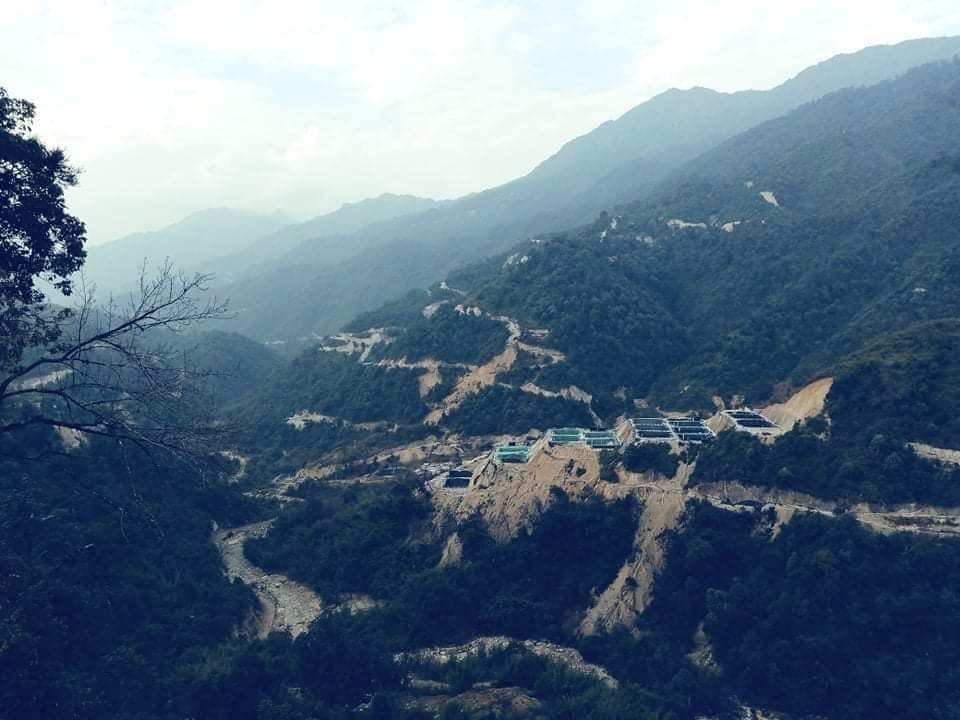
‘Nothing can live there’
As rare earth mining has shifted from China across the border into Myanmar, the environmental consequences appear to have followed. According to Hammond of Global Witness, the “relatively weak rule of law” in the area means that rare earth mining often doesn’t meet even “basic environmental standards.”
Frontier’s interviews, along with other media reports, have revealed concerns about contaminated soil and water sources as well as erosion, which local activists and mine workers told Frontier was causing landslides as well as sediment build-up in the Chipwi River. They also said that little heed was paid to worker safety.
Seng Awng, the pseudonym for a 30-year-old Kachin from a village near Myitkyina, began working for a mining company whose name he does not know in September 2019. Sut Hting, the pseudonym for a 60-year-old Kachin who lives in a displaced person camp in Myitkyina township, also worked for a company whose name he did not know from December 2017 to May 2018.
The two workers said they knew little about the chemicals used in the mining process. Seng Awng described the powders he worked with as similar to salt, while Sut Hting said that the chemical liquids and powders were stored in containers with lettering in Chinese. “Most local workers don’t understand what’s written on those containers, and no one comes to explain,” he said.
Sut Hting avoided work which involved handling chemicals, even though it paid better, because workers said the chemicals harmed their health. “Most workers didn’t want those jobs. They just did it for one or two months,” he said. “They said those chemical liquids and powders harmed their health. Some workers even got sick. The company didn’t provide proper safety equipment.”
Seng Awng, who was among workers who handled chemicals, said he wore gloves but the few times he touched the powder or liquid, he felt a slight burning sensation.
He said workers avoided using local water sources for drinking or bathing and that forests in the area had been destroyed. “There’s nothing left there, not even trees. They cut the trees and burn them. In the working area, there is not a single animal,” he said.
‘Mining can happen more freely than before’
Those interviewed by Frontier and Danwatch believed that rare earth mining had picked up speed since the February 1 military coup.
“Since the coup we’ve seen an increase in rare earth mining in Kachin State and we expect the lawless environment to be conducive to the business interests of militia groups more broadly,” said Hammond of Global Witness. “Illegal activity thrives in anarchic conditions, and the post-coup chaos has created a perfect opportunity for bad actors to take advantage by pillaging Myanmar’s natural resources.”
Hkalen Tu Hkawng of the National Unity Government also forecast rare earth mining to increase. “When the public and activists don’t have the freedom to advocate for the rule of law and law enforcement, and when their ability to monitor becomes weak, rare earth mining can happen more freely than before,” he said.
As the buyer of rare earth from Myanmar, China has a significant amount of leverage to tackle the rampant illegal mining of rare earths in Kachin State – if it chooses to do so.
In January, China introduced draft policies for regulating the rare earth industry chain, which include prohibiting the purchase and sale of products extracted illegally and establishing a tracking system for rare earth.Hammond called on China to do more to stop the illicit cross-border rare earth industry, pointing out that it provided no benefit to communities, who only see the destruction of their land. “Rare earth mining in Kachin is benefitting militia leaders who answer to Myanmar’s military, and who provide support to the military in exchange for being allowed to pursue illicit business interests,” she said. “Cutting off sources of funding to these groups will in turn put pressure on the military.” – Additional reporting by Jaw Tu Hkawng


